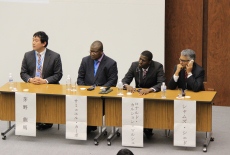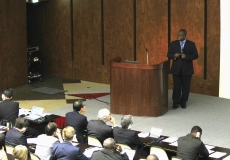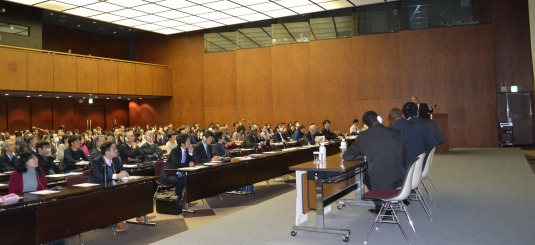WKC Forum report "Fight against Communicable Diseases - Thinking about Global Health Governance @ Kobe & Hyogo"

The WHO Kobe Centre, along with the G7 Kobe Health Ministers' Meeting Promotion Committee and the Ministry of Health, Labour and Welfare, Japan held an open, public Forum “Fight against Communicable Diseases -Thinking about Global Health Governance @ Kobe & Hyogo,” on 24 February 2016, from 18:00 to 19:30 at the Kobe International Conference Center.
This autumn, on 11 and 12 September 2016, the G7 Health Ministers' Meeting will be held in Kobe City, where the G7 countries (Canada, France, Germany, Italy, Japan, United Kingdom and USA) will discuss urgent global health issues, including how national and local health policies and systems can prevent and control communicable diseases and be better prepared for natural disasters and health risks – referred to as “Global Health Governance” and Global Health Risk Management.
 About 250 people attended the Forum with participants from the Kobe City Diet, Kobe City, Hyogo Prefectural and other municipal governments, health professional and associations, students, and the public at large. Four speakers from the WHO and from Sierra Leone made presentations (slides attached).
About 250 people attended the Forum with participants from the Kobe City Diet, Kobe City, Hyogo Prefectural and other municipal governments, health professional and associations, students, and the public at large. Four speakers from the WHO and from Sierra Leone made presentations (slides attached).
Mr Mitsuaki Yamamoto, Chief Medical Officer, Hyogo Prefecture, welcomed the audience and, on behalf of hosting place for the G7 Health Ministers meeting in 2016, thanked the WHO Kobe Centre for organizing the Forum and the speakers for their participation. He noted the timeliness of the Forum as it is 200 days before the G7 Health Ministers meeting and the relevance of global health and human security to Hyogo Prefecture and Kobe City.
Mr Alex Ross, Director of the WHO Kobe Centre, welcomed the audience, and thanked the G7 Health Ministers Promotion Committee, Hyogo Prefecture, Kobe City, the Japanese Ministry of Health, Labour and Welfare, and the speakers. He remarked how many outbreaks and disasters -- from the recent Zika virus, Ebola, spread of dengue, earthquakes in Nepal and Taiwan, typhoons in Fiji – require collective action to build resilient health systems, preparedness, and support resilient societies and people. He further applauded Prime Minister Abe and the Government of Japan for its leadership on global health security, an issue that will be discussed at the G7 Summit in Ise-shima and at the G7 Health Ministers meeting in Kobe.

Dr Samuel Kargbo, Director of Ministry of Health from Sierra Leone, one of the Ebola affected countries, spoke about “Experiences and lessons learnt on the fight against Ebola, How to increase effectiveness of disaster risk management”. Dr Kargbo talked how the initial response to the Ebola was difficult, with lack of scientific knowledge, weak community engagement and awareness (including for safe burial procedures), inadequate surveillance, and inadequate Infection Prevention and Control (IPC). Analysing and learning from various issues people faced at the height of the outbreak, a new incident management system is now established and applied to every district. He mentioned some key recommendations for all countries: focus on community health systems; set up comprehensive quality assurance and infection prevention and control systems, have uninterrupted supplies of needed commodities, and strengthen the surveillance and laboratory system. Smooth communications and response among community, district, and national level could be realized.
Dr Ronald Carshon-Marsh, the Medical Superintendent of Kono District in Sierra Leone (one the hardest hit areas from Ebola) talked about how they fought against the outbreak, without enough knowledge and experiences, protective equipment or standardized training. Dr Carshon-Marsh discussed how he also had to face the death of his colleagues. The community lacked confidence in the health workers; revolting against them and attacked hospitals—with doctors leaving. The suspected cases needed to be transported from one place to another and as a result, spread the disease further through direct contact with contaminated body fluids. WHO, US Centers for Disease Control and Prevention (CDC), and the International Rescue Committee (IRC) and other organizations were fully supportive. They assisted the local health authorities to develop a concerted and coordinated plan and response, including the key action to engage community chiefs/traditional leaders. Global and local actions helped to end the outbreak.
Dr Shamsuzzoha Babar Syed, Coordinator, Quality and UHC, Service Delivery and Security Department, WHO Geneva, talked about WHO’s efforts to support the Ebola affected countries. He noted the important lessons obtained from the realities at the front line in these countries. These lessons are helping to inform how WHO, international organizations, countries, and partners can further refine global health governance for health emergencies. Inspired by and working with frontline workers like Dr Kargbo and Dr Carshon-Marsh worked tirelessly in their country at the height of the response, WHO has been helping countries in early recovery efforts that would lead to sustainable, functional and resilient health systems. The road to early recovery starts with re-establishing strong health systems and key actions needed are: to safely reactivate essential health services; rebuild community trust and engagement, ensure safety of health workers and patients and the delivery of quality health services. He noted that global health security cannot happen without local health security and emphasized quality UHC with disaster preparedness, response and recovery embedded in health system strengthening and development.


